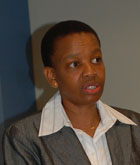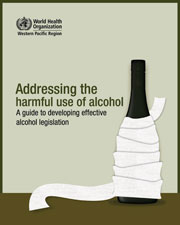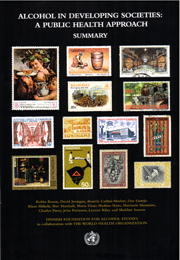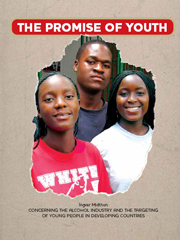
Alcohol as a development issue discussed in Oslo and Stockholm

Binge drinking is prevalent in South Africa, and many of the sad consequences of alcohol use are of the acute kind; violence in the streets, injuries, accidents, domestic violence and sexual risk behaviour.
This picture of the South African situation was drawn up by Dr. Neo Morojele at two conferences on alcohol as a development issue, held in Oslo and Stockholm last week. Dr. Morojele is the Deputy Director of the Alcohol and Drug Abuse Research Unit at the Medical Research Council of South Africa. Her research is now focusing on the links between alcohol and hiv/aids and on substance abuse among youth, among other things.
At the two conferences in Oslo and Stockholm a broad selection of documentation was presented, highlighting alcohol as an obstacle to development and the links between alcohol an other development issues; domestic violence, gender, poverty, hiv/aids etc. More than 60 persons attended the conference in Oslo on the 26th, while over hundred came to the conference in Stockholm the next day.
At the Oslo conference a new toolkit for development agencies was presented for the first timed. These tools shall make it easier for non-specialized development agencies to involve in alcohol and drug prevention.
Dr. Neo Morojele gave an alarming picture of the alcohol situation in South Africa, also on the gender dimension of the issue. While men are more likely to consume alcohol, women tend to have a very risky drinking pattern once they start drinking, in some cases more harmful than men. One of the dramatic consequences of this in South Africa is the rate of Foetal Alcohol Syndrome (FAS) among newborn babies. FAS is a complex of mental and physical harm on the foetus because of drinking by mothers during pregnancy. South Africa has the highest rate of FAS in the world, much higher than most other countries. Studies have established that in some regions of the Republic between 46 and 75 babies per 1000 are born with mental or physical disorders because of alcohol. To put this in perspective, the corresponding figures in the USA are 0,05 - 2 out of every 1000 newborn babies.
Download Neo Morojele's presentation here.

Download Dag Rekve's presentation here.

He also discussed the concept of poverty and how to eradicate poverty. – Development programs often focus only on increasing the income of poor households, not the spending side of the problem. Increased income is a necessity for many deprived families in the world, but one should also focus on how money is being used. In Sri Lanka many poor households do have a basic income, but do not spend the available cash to create welfare and development for the family. Studies indicate that alcohol seems to be a major field of spending for too many poor households, with many detrimental effects on their social and economical situation.
Download Diyanath Samarasinghe's presentation here.
Øystein Bakke, program manager for alcohol and drugs in FORUT, the Norwegian Campaign for Development and Solidarity, used his presentation at the conferences to describe how the multinational drinks industry sees countries in the South as promising markets. By aggressive marketing and lobbying they try to establish new drinking patterns and promote Western alcohol brands especially in the big and growing economies like China, India and Brazil.
![]()
![]()
Developed with CustomPublish CMS by Nettinfo AS




